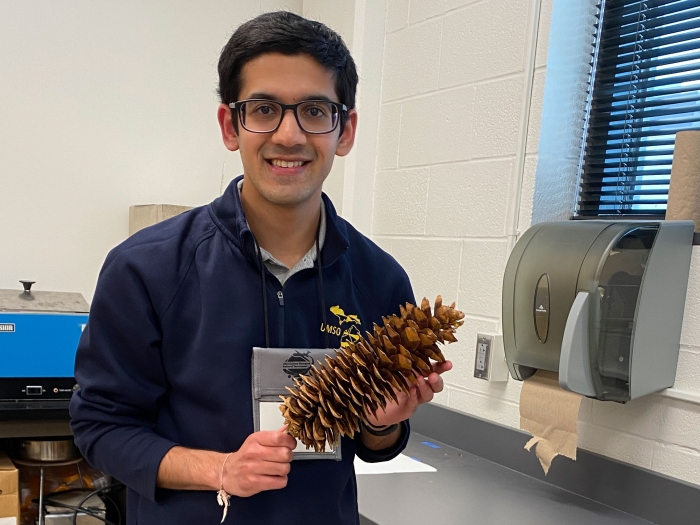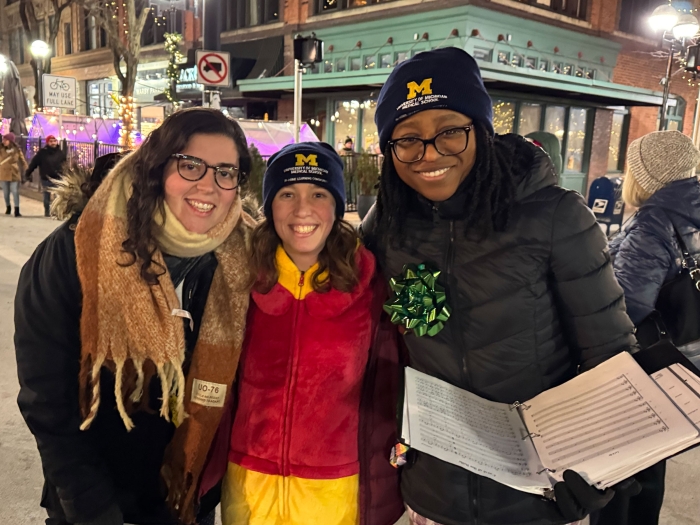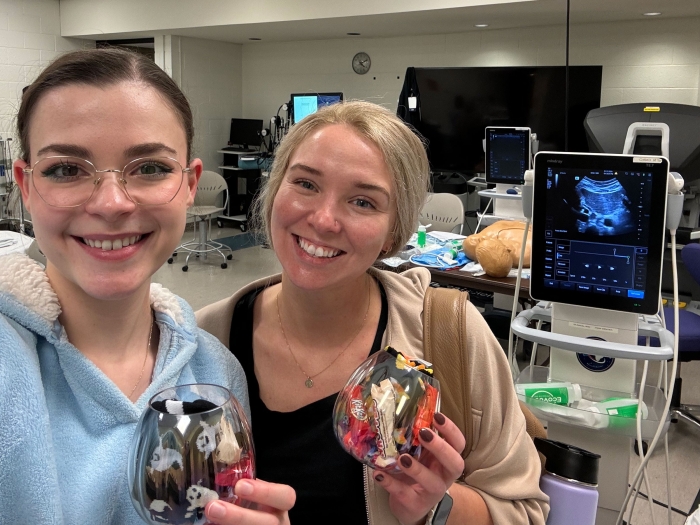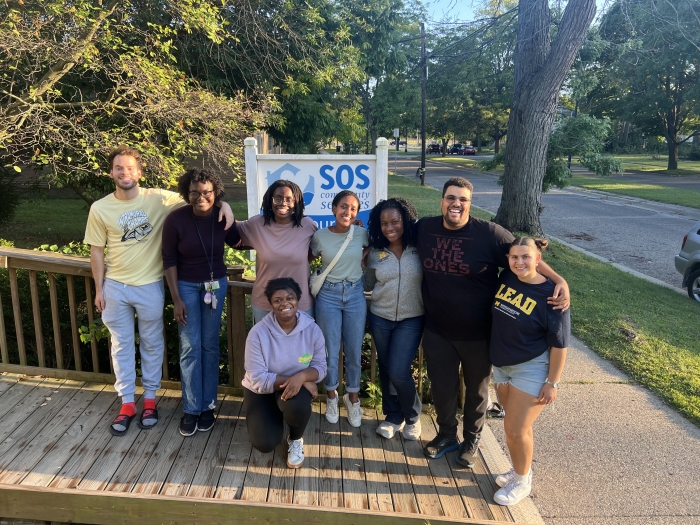
Gabriela's Michigan Answer: Being involved with Latinx and Native American Medical Association (LANAMA) and Socially Responsible Surgery (SRS) has allowed me to explore various ways in which I can grow and become a better leader and advocate for individuals with diverse backgrounds.
Gabriela Leticia Maica (she/her/ella), pictured far right above, comes from Staten Island, NY. She graduated from Dartmouth in 2014 and knew early on that she wanted to pursue a path in medical school focusing on patient experiences and US public policy regarding health care. The memories and friendships Gabriela has made through academics and student organizations continue to motivate her to strengthen research partnerships and advocate for community voices in the field of healthcare.
What called you to explore a career in medicine?
Growing up with parents who came to the US in their mid-20s from Peru and Ecuador, I was constantly the middle person when it came to communicating medical knowledge to my family members. Because of this role, I had a close view on the many barriers that continued to exist in medicine. When my grandfather was hospitalized due to lung cancer, I saw the difficulties he faced as a Spanish-speaking patient battling suicidal thoughts. Communication and cultural understanding proved to be difficult between him and the medical team, and I saw first-hand the dangers of not utilizing a medical interpreter during a patient’s care. This experience motivated me to want to gain the skills and knowledge on how to break through the language and cultural barriers that exist in many low-income communities in medicine.
Why did you decide to attend Michigan?
During my interview day, I experienced that “gut feeling” where I just knew I had met the group of people I wanted to grow and learn alongside during my medical school journey. There was a strong sense of community that was palpable to me throughout the day, and I knew I would be able to find a support system because of all the resources the University of Michigan Medical School provides. I also really liked having a 1-year preclinical curriculum as I wanted to have more time and flexibility during my M3 year to explore various specialties because I had no idea what I wanted to go in to before I started medical school.
Why did you decide to earn a dual degree while in med school: what has the experience been like and what advice do you have for others who are considering a dual degree in medical school?
As my interest in applying into surgery grew, I wanted to further explore the intersection of business and health care and how this can affect surgical outcomes and access to necessary procedures for low-income communities. I wanted to take a deeper dive on how health care systems are run in the United States from a management perspective and how the healthcare and health insurance markets function, as well as further understand the government’s role in financing care.
Therefore, I decided to take a leave of absence after my M3 year and apply to the Ross Business School at Michigan to earn my MBA. My MBA1 year has been a steep learning curve, as I had limited knowledge on basic economics before starting this year, but so far it has been a rewarding experience as I have had the opportunity to take electives that focus on healthcare issues in the US and public policy. I am also very excited to soon find out my MAP project, which is a multidisciplinary action project where I get the opportunity to work with fellow MBA students to provide solutions to real issues that a company might be facing.
Share the research activities you’ve become involved in at Michigan.
Given my upbringing and first-hand experiences observing language barriers in medicine, I wanted to further explore the utilization of interpreter services in a surgical setting. During my M1/M2 year, I was able to join a research project created by a fellow medical student under the guidance of Dr. Reddy, which hypothesized that interpreter services can be underutilized for surgical patients. Through chart review, our data demonstrated that our hypothesis was in fact true and was a significant issue for patient care. I wanted to expand on this topic and during my M3 year, I had the opportunity to create a research proposal via a student research elective. This project would instead focus on the patient perspective on the utilization of interpreter services in the post-operative setting and the impact on patient care. The goal of this project is to ask patients their experiences with interpreter services and their medical team via survey questions in their primary language.
What are the ways in which you’ve been able to explore your passions during med school and what resources or people have helped you do so?
As a non-traditional first-generation Latina medical student, I wanted to ensure that while I began my medical school journey at the University of Michigan Medical School, I continued to immerse myself in initiatives that would advocate and uplift Latinx communities and individuals. As I began my first year at UMMS, I actively continued to mentor other students who come from underrepresented backgrounds in their journey to become health care professionals. Since I completed a post-baccalaureate health careers program at Harvard prior to medical school and was subsequently a TA for a chemistry course, I continued to tutor and mentor multiple students in this program virtually, counseling them through their path in the program or helping them prepare for their application.
I also became a mentor for the Latinx Undergraduate Medical Association (LUMA) here at the University of Michigan. I was able to develop similar relationships with students in their 3rd and 4th year who are in the middle of either MCAT exam preparation or contemplating gap years prior to applying into medical school. Mentoring those that come from disadvantaged backgrounds matters now more than ever as the COVID-19 pandemic has shown us how much more work is needed in closing the gaps in health disparities.
What are some of the things you have learned/insights you have gained so far?
During my first year at UMMS, I knew I wanted to join an organization that would feel like a second home away from home. LANAMA, the Latinx and Native American Medical Association, became my “familia” here at Michigan as I was able to form close friendships with those in the group, some of whom I would consider my best friends. LANAMA, which is the Latino Medical Student Association (LMSA) chapter of UMMS, was originally founded to create a supporting environment for Latino and Native American medical students along with other allies, as well as to help increase diversity in the medical field, improve cultural sensitivity/understanding, and raise awareness of health and social inequities.
As Vice President my M1 year and then Co-President my M3/leave of absence years, I wanted to continue to strengthen our organization and community through more faculty support, increasing Native voices in our executive board, establishing community and research partnerships to provide intra-organizational opportunities such as a Latinx Community Health Fair, and most importantly, advocating for and uplifting the local Latinx and Native American communities in the Ann Arbor and Detroit Metro Area. To increase awareness of critical issues impacting Latinx communities, LANAMA joined a consortium of Latinx graduate school organizations at U-M called Puentes, where we took part in the first annual Latinx research week in March 2023 showcasing projects by Latinx medical students and faculty, as well as highlighting projects centering around the general Latinx community.
By being in LANAMA, I was able to go to LMSA Midwest conferences, where I would meet other Latinx medical students in the Midwest area as well as Latinx physicians in various specialties and learn from their experiences. I have been able to form long-lasting memories and friendships through LANAMA and for that I will always be grateful.
What are some of the things you like about going to medical school in a college town? Anything unexpected?
I was super excited to know that I was going to UMMS in Ann Arbor where college football was huge. Becoming a Michigan football fan, going to the tailgates before the games and being at the Big House during the games has been such a fun experience. I will always remember Michigan becoming the 2023 National Champions this year!! Who knows, we could get a repeat next year! Go Blue!!!
How have you been able to connect with faculty mentors and peer mentors and how has that been important to your med school journey?
Through LANAMA, I have been able to form mentorships with Latinx faculty, residents and allies at Michigan. This was really important to me as no one else in my family is a physician or in the medical field, so I wanted to make sure that I found mentors that I could turn to for advice/help. I wanted to feel comfortable being able to share my struggles with someone with a similar background to mine.
I was also part of LEAD my M1 year, the Leadership and Enrichment for Academic Diversity program at UMMS, and I was grateful to also meet faculty members that became my mentors later on as I was deciding on specialties and needed guidance on how to set myself up for success for my sub-Is and M3 year.





